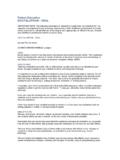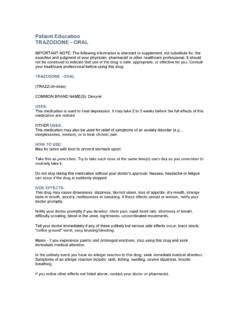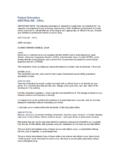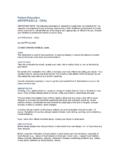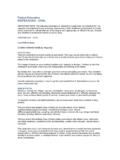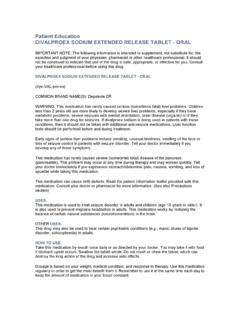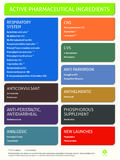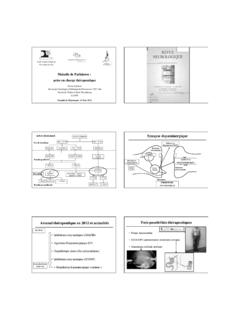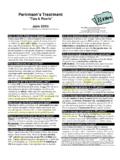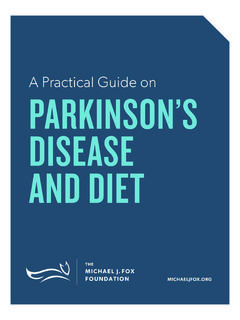Transcription of Patient Education DULOXETINE - ORAL
1 Patient Education DULOXETINE - ORAL IMPORTANT NOTE: The following information is intended to supplement, not substitute for, the expertise and judgment of your physician, pharmacist or other healthcare professional. It should not be construed to indicate that use of the drug is safe, appropriate, or effective for you. Consult your healthcare professional before using this drug. DULOXETINE - ORAL (dull-OX-eh-teen) COMMON BRAND NAME(S): Cymbalta USES: DULOXETINE is used to treat major depression and also used to relieve nerve pain (peripheral neuropathy) in diabetics.
2 This medication works by restoring the balance of two kinds of natural substances (neurotransmitters known as serotonin and norepinephrine) in the brain, thereby improving mood and feelings of well-being. HOW TO USE: Take this medication by mouth; with or without food usually once or twice a day depending on the amount that you take; or as directed by your doctor. This medicine should not be crushed, chewed or mixed with food or liquid. Swallow it whole. Dosage is based on your medical condition and response to therapy.
3 Use this medication regularly in order to get the most benefit from it. Remember to use it at the same times each day. It is important to continue taking this medication even if you feel well. Do not stop taking this medication without consulting your doctor. Some conditions may become worse when the drug is suddenly stopped. Your dose may need to be gradually decreased. It may take between 1 to 4 weeks before the full benefit of this drug takes effect. Inform your doctor if your condition persists or worsens.
4 SIDE EFFECTS: Nausea, dry mouth, constipation, loss of appetite, fatigue, drowsiness, dizziness, increased sweating, blurred vision, rash, or itching may occur. If any of these effects persist or worsen, notify your doctor or pharmacist promptly. Tell your doctor immediately if any of these unlikely but serious side effects occur: unusual or severe mental/mood changes ( , anxiety, mania), weight loss, change in sexual desire and ability, uncontrolled movements (tremor), difficulty urinating. Tell your doctor immediately if any of these highly unlikely but very serious side effects occur: chest pain, stomach pain, black stools, vomit that looks like coffee grounds, easy bruising/bleeding, unusual bleeding, seizures.
5 If you notice other effects not listed above, contact your doctor or pharmacist. PRECAUTIONS: Before taking DULOXETINE , tell your doctor or pharmacist if you are allergic to it; or if you have any other allergies. This medication should not be used if you have certain medical conditions. Before using this medicine, consult your doctor or pharmacist if you have: severe kidney disease, glaucoma (uncontrolled narrow-angle). Before using this medication, tell your doctor or pharmacist your medical history, especially of: other mental/mood disorders ( , bipolar disorder, mania), liver disease, kidney disease, stomach problems ( , bleeding or slow stomach emptying), drug or alcohol abuse, seizure disorder.
6 Though uncommon, depression can lead to thoughts or attempts of suicide. Tell your doctor immediately if you have any suicidal thoughts, worsening depression, or any other mental/mood changes (including new or worsening anxiety, agitation, panic attacks, trouble sleeping, irritability, hostile/angry feelings, impulsive actions, severe restlessness, rapid speech). Keep all medical appointments so your healthcare professional can monitor your progress closely and adjust/change your medication if needed.
7 This drug may make you dizzy or drowsy; use caution engaging in activities requiring alertness such as driving or using machinery. Limit alcoholic beverages. If you are pregnant, this medication should be used only when clearly needed during the first 6 months of pregnancy. Due to possible complications to an infant at birth, this medicine is not recommended for use during the last 3 months of pregnancy. Discuss the risks and benefits with your doctor. It is unknown if this medication passes into breast milk.
8 Breast-feeding while taking this drug is not recommended. Consult your doctor before breast-feeding. DRUG INTERACTIONS: Certain medications taken with this product could result in serious, possibly fatal, drug interactions. Avoid taking drugs called MAO inhibitors ( , furazolidone, isocarboxazid, linezolid, moclobemide, phenelzine, procarbazine, selegiline, tranylcypromine) with or within 2 weeks of starting DULOXETINE or at least 5 days after stopping it. This drug should also not be used with the following medication because very serious (possibly fatal) interactions may occur: thioridazine.
9 If you are currently using any of these medications, tell your doctor or pharmacist before starting DULOXETINE . Before using this medication, tell your doctor or pharmacist of all prescription and nonprescription/herbal products you may use, especially of: cimetidine, ciprofloxacin, certain drugs used to treat abnormal heart rhythms ( , propafenone, flecainide, quinidine), certain SSRI anti-depressants (fluoxetine, fluvoxamine, paroxetine), other drugs which can cause bleeding/bruising ( , thrombolytic drugs such as TPA, anticoagulants such as heparin or warfarin, antiplatelet drugs including NSAIDs such as ibuprofen).
10 Low-dose aspirin (usually 81-325 mg per day) for heart attack or stroke prevention should be continued unless your doctor instructs you otherwise. Aspirin is similar to NSAID drugs, and can increase the risk of bleeding in combination with this medication (see above). Discuss the risks and benefits with your doctor. Tell your doctor or pharmacist if you also take drugs that cause drowsiness such as: certain antihistamines ( , diphenhydramine), anti-anxiety drugs ( , diazepam), anti-seizure drugs ( , carbamazepine), medicine for sleep ( , sedatives), muscle relaxants, narcotic pain relievers ( , codeine), psychiatric medicines ( , phenothiazines such as chlorpromazine, or tricyclics such as amitriptyline), tranquilizers.
